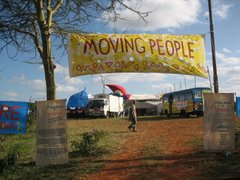
The China Web2.0 Review blog recently covered several new Chinese travel sites, comparing them to some of the more popular US travel sites.
Comparing Some New Chinese Travel Websites
The author of that blog post concludes that "Overall, None of these websites seems really impressive. They are still far behind Ctrip on user base. I think adding more innovative ideas like personalized travel plan similar to what Yahoo Travel and TripHub did may help them gaining ground in the online traveling market."
I have an article in this month's (Oct 2007) issue of the Far Eastern Economic Review. Unfortunately, my article (titled "China's Growing Wanderlust"), cannot be seen without a paid subscription. One of the topics that I cover in that article is the state of online travel in China. A few points that I make are:
- Although online travel bookings in China grew 72 percent in 2006 to over 2.75 million bookings, valued at 1.54 billion yuan (US$204 million), it pales in comparison to the US, where the online travel market generated revenues of US$83 billion in 2006.
- Chinese consumers have been wary of both online transactions and the use of credit cards (both on- and off-line).
- Chinese travel agents discourage online bookings because they pay higher credit card fees online (1.0%) compared to in person (0.1%). So the approach to online travel in China is to direct the public to call centers for information and bookings, and to travel agency offices for cash transaction.
- Successful online travel agencies in China negotiate special travel packages at favorable prices that are attractive to the middle and upper classes, who are also more willing to use credit cards and pay a little more for the convenience of online travel bookings.
- The biggest online travel agency, by far, in China is Ctrip.com, which accounted for 54.2% of online sales in 2006, followed by eLong.com with 17.8 percent of the market. Expedia.com owns 52 percent of eLong.com, but also has its own China website this year.
(This blog entry was originally posted on my Web 2.0 Travel blog. - Alan)
